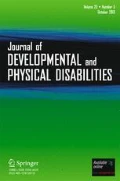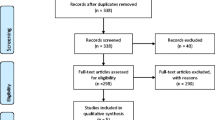Abstract
This paper examined the experiences of people with spinal cord injury and related neurological conditions (collectively referred to as SCI) who participated in a peer education program in Fiji and explored their perceptions of its impact on their community participation.The study used an exploratory qualitative design, involving nine people with SCI. Data were obtained via semi-structured interviews, six months after the initial peer education program delivered by the first author and another Australian wheelchair user. Three themes described participants’ experiences and perceptions of the peer education program. The world closes down illustrated the way that physical environments and community attitudes were unsupportive of participants’ fulfilling life roles. Seeing the possibilities described the participants’ experiences of learning from peers and beginning to imagine new possibilities. The final theme, Opening up the world, identified their perception of the peer education program’s impact, as their worlds opened up, and they resumed previously abandoned responsibilities and activities. Participants valued contact with peer educators as much as they did the content taught. Their greater sense of confidence, communication skills and wheelchair use contributed to participants’ increased sense of community participation.
Similar content being viewed by others
References
Balcazar, F. E., Kelly, E. H., Keys, C. B., & Balfanz-Vertiz, K. (2011). Using peer mentoring to support the rehabilitation of individuals with violently acquired spinal cord injuries. Journal of Applied Rehabilitation Counseling, 42(4), 3.
Barclay, L., McDonald, R., Lentin, P., & Bourke-Taylor, H. (2016). Facilitators and barriers to social and community participation following spinal cord injury. Australian Occupational Therapy Journal, 63(1), 19–28. https://doi.org/10.1111/1440-1630.12241.
Beauchamp, M. R., Scarlett, L. J., Ruissen, G. R., Connelly, C. E., McBride, C. B., Casemore, S., & Martin Ginis, K. A. (2016). Peer mentoring of adults with spinal cord injury: a transformational leadership perspective. Disability and Rehabilitation, 38(19), 1884–1892. https://doi.org/10.3109/09638288.2015.1107773.
Best, K. L., Miller, W. C., Huston, G., Routhier, F., & Eng, J. J. (2016). Pilot study of a peer-led wheelchair training program to improve self-efficacy using a manual wheelchair: a randomized controlled trial. Archives of Physical Medicine and Rehabilitation, 97(1), 37–44.
Burns, A. S., & O'Connell, C. (2012). The challenge of spinal cord injury care in the developing world. Journal of Spinal Cord Medicine, 35(1), 3–8. https://doi.org/10.1179/2045772311Y.0000000043.
Chaffey, L., & Bigby, C. (2017). Health education by peers with spinal cord injury: a scoping review. Journal of Developmental and Physical Disabilities, 1–14. https://doi.org/10.1007/s10882-017-9569-6.
Chamberlain, J. D., Meier, S., Mader, L., Von Groote, P. M., & Brinkhof, M. W. (2015). Mortality and longevity after a spinal cord injury: systematic review and meta-analysis. Neuroepidemiology, 44(3), 182–198.
Cogan, A. M., & Carlson, M. (2017). Deciphering participation: an interpretive synthesis of its meaning and application in rehabilitation. Disability and Rehabilitation, 1–12. https://doi.org/10.1080/09638288.2017.1342282.
Consortium for Spinal Cord Medicine. (2008). Early acute Management in Adults with spinal cord injury: a clinical practice guideline for health-care professionals. The Journal of Spinal Cord Medicine, 31(4), 403–479. https://doi.org/10.1043/1079-0268-31.4.408.
Dijkers, M. P. (2010). Issues in the conceptualization and measurement of participation: an overview. Archives of Physical Medicine and Rehabilitation, 91(9), S5–S16.
Faulkner, G., Gorczynski, P., Arbour, K., Letts, L., Wolfe, D., & Ginis, K. A. M. (2010). Messengers and methods of disseminating health information among individuals with spinal cord injury: A scoping review. In T. C. Berkovsky (Ed.), Handbook of spinal cord injuries (pp. 349–374). New York: Nova Science Pubishers.
Gajraj-Singh, P. (2011). Psychological impact and the burden of caregiving for persons with spinal cord injury (SCI) living in the community in Fiji. Spinal Cord, 49(8), 928–934. https://doi.org/10.1038/sc.2011.15.
Geyh, S., Nick, E., Stirnimann, D., Ehrat, S., Michel, F., Peter, C., & Lude, P. (2012). Self-efficacy and self-esteem as predictors of participation in spinal cord injury—an ICF-based study. Spinal Cord, 50(9), 699–706.
Ginis, K. A. M., Evans, M. B., Mortenson, W. B., & Noreau, L. (2017). Broadening the conceptualization of participation of persons with physical disabilities: a configurative review and recommendations. Archives of Physical Medicine and Rehabilitation, 98(2), 395–402.
Haas, B. M., Price, L., & Freeman, J. A. (2013). Qualitative evaluation of a community peer support service for people with spinal cord injury. Spinal Cord, 51(4), 295–299. https://doi.org/10.1038/sc.2012.143.
Hammel, J., Magasi, S., Heinemann, A., Whiteneck, G., Bogner, J., & Rodriguez, E. (2008). What does participation mean? An insider perspective from people with disabilities. Disability and Rehabilitation, 30(19), 1445–1460. https://doi.org/10.1080/09638280701625534.
Hartley, N. A. (2015). Spinal cord injury (SCI) rehabilitation: systematic analysis of communication from the biopsychosocial perspective. Disability and Rehabilitation, 37(26), 2383–2392. https://doi.org/10.3109/09638288.2015.1027008.
Howitt Browning, J. (2010). Peer training as a cost-effective tool for SCI management in low-income countries Paper presented at the International Spinal Cord Society Conference, New Delhi.
Jalovcic, D., & Pentland, W. (2009). Accessing peers' and health care experts' wisdom: A telephone peer support program for women with SCI living in rural and remote areas. Topics in Spinal Cord Injury Rehabilitation, 15(1), 59–74.
Jensen, M., Molton, I., Groah, S., Campbell, M., Charlifue, S., Chiodo, A., et al. (2012). Secondary health conditions in individuals aging with SCI: terminology, concepts and analytic approaches. Spinal Cord, 50(5), 373–378.
Kachingwe, A., & Cornick, C. (2011). Most significant change/focus group discussions. peer group training of trainers participants. Monitoring tool : AWUNA-MAF01. Retrieved from Malawi.
Klein, L. A., Ritchie, J. E., Nathan, S., & Wutzke, S. (2014). An explanatory model of peer education within a complex medicines information exchange setting. Social Science & Medicine, 111, 101–109. https://doi.org/10.1016/j.socscimed.2014.04.009.
Latimer-Cheung, A. E., Arbour-Nicitopoulos, K. P., Brawley, L. R., Gray, C., Wilson, A. J., Prapavessis, H., et al. (2013). Developing physical activity interventions for adults with spinal cord injury. Part 2: Motivational counseling and peer-mediated interventions for people intending to be active. Rehabilitation Psychology, 58(3), 307–315. https://doi.org/10.1037/a0032816.
Liamputtong, P. (2007). Researching the vulnerable: A guide to sensitive research methods. London: Sage.
Liamputtong, P. (2009). Qualitative research methods (Third ed.). Melbourne: Oxford University Press.
Ljungberg, I., Kroll, T., Libin, A., & Gordon, S. (2011). Using peer mentoring for people with spinal cord injury to enhance self-efficacy beliefs and prevent medical complications. Journal of Clinical Nursing, 20(3/4), 351–358. https://doi.org/10.1111/j.1365-2702.2010.03432.x.
Munce, S. E. P., Webster, F., Fehlings, M. G., Straus, S. E., Jang, E., & Jaglal, S. B. (2014). Perceived facilitators and barriers to self-management in individuals with traumatic spinal cord injury: a qualitative descriptive study. BMC Neurology, 14(1). https://doi.org/10.1186/1471-2377-14-48.
Phang, S. H., Martin Ginis, K. A., Routhier, F., & Lemay, V. (2012). The role of self-efficacy in the wheelchair skills-physical activity relationship among manual wheelchair users with spinal cord injury. Disability & Rehabilitation, 34(8), 625–632. https://doi.org/10.3109/09638288.2011.613516.
Price, P., Stephenson, S., Krantz, L., & Ward, K. (2011). Beyond my front door: The occupational and social participation of adults with spinal cord injury. OTJR Occupation, Participation and Health, 31(2), 81–88. https://doi.org/10.3928/15394492-20100521-01.
QSR International. (2012). NVivo qualitative data analysis software, Version 10: QSR International Pty Ltd.
Ripat, J., & Woodgate, R. L. (2012). Self-perceived participation among adults with spinal cord injury: a grounded theory study. Spinal Cord, 50(12), 908.
Statewide Rehabilitation Clinical Network. (2012). Model of rehabilitation for spinal cord injury in South Australia. Retrieved from Adelaide.
Sweet, S. N., Noreau, L., Leblond, J., & Martin Ginis, K. A. (2016). Peer support need fulfillment among adults with spinal cord injury: relationships with participation, life satisfaction and individual characteristics. Disability and Rehabilitation, 38(6), 558–565. https://doi.org/10.3109/09638288.2015.1049376.
Tavola, H. (2012). Addressing inequalities: Disability in pacific island countries. Suva, Fiji: United Nations Economic and Social Commission for Asia and the Pacific.
United Nations (UN). (2006). Convention on the rights of persons with disabilities. New York: UN.
Whalley Hammell, K. (2007). Experience of rehabilitation following spinal cord injury: A meta-synthesis of qualitative findings. Spinal Cord, 45(4), 260–274. https://doi.org/10.1038/sj.sc.3102034.
Wiggins, N. (2012). Popular education for health promotion and community empowerment: a review of the literature. Health Promotion International, 27(3), 356–371. https://doi.org/10.1093/heapro/dar046.
Acknowledgements
The authors wish to thank Tim Rushby-Smith and Motivation Australia for their insights into peer education. This work was supported by La Trobe Asia; and La Trobe University Institute for Human Security and Social Change.
Author information
Authors and Affiliations
Corresponding author
Ethics declarations
Ethical Approval
All procedures performed in studies involving human participants were in accordance with the ethical standards of the institutional and/or national research committee and with the 1964 Helsinki declaration and its later amendments or comparable ethical standards.
Informed Consent
Informed consent was obtained from all individual participants included in the study.
Conflict of Interest
Lisa Chaffey declares that she has no conflict of interest. Christine Bigby declares that she has no conflict of interest.
Rights and permissions
About this article
Cite this article
Chaffey, L., Bigby, C. ‘I Feel Free’: the Experience of a Peer Education Program with Fijians with Spinal Cord Injury. J Dev Phys Disabil 30, 175–188 (2018). https://doi.org/10.1007/s10882-017-9578-5
Published:
Issue Date:
DOI: https://doi.org/10.1007/s10882-017-9578-5



